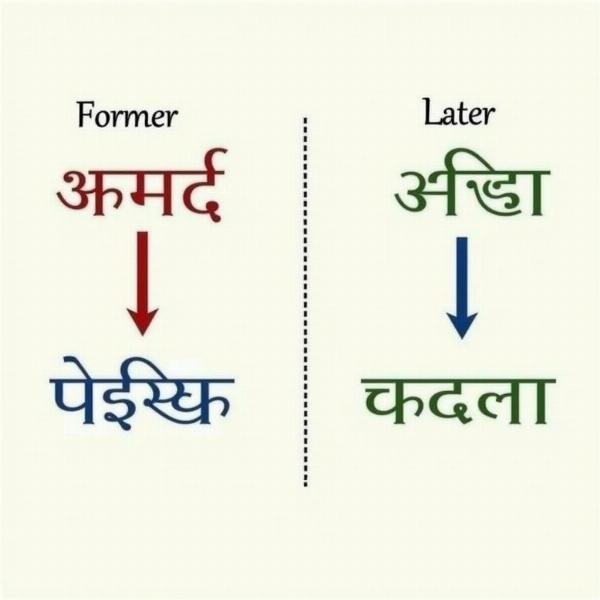Understanding the hindi meaning of “latter” is crucial for anyone navigating the nuances of the Hindi language. The English word “latter” refers to the second of two things mentioned. Knowing the correct Hindi equivalent not only avoids miscommunication but also demonstrates a deeper understanding of the language. This article will explore the various ways to express “latter” in Hindi, providing context and examples to ensure clarity.
Different Ways to Express “latter” in Hindi
Hindi doesn’t have a single, direct equivalent for “latter”. The translation depends on the context of the sentence. Here are some common ways to convey the meaning of “latter” in Hindi:
-
बाद वाला (baad wala): This is perhaps the most common and versatile translation. It literally means “the one after” or “the later one”. It can be used for both animate and inanimate objects.
-
अंतिम (antim): This word means “last” or “final”. It’s suitable when referring to the last item in a sequence of two.
-
दूसरा (dusra): Meaning “second”, this word works when the context clearly indicates a comparison between two things.
-
पिछला (pichla): While typically meaning “previous”, पिछला can sometimes be used to mean “latter” if the sentence structure implies a reversed order of mention. However, this usage requires careful consideration to avoid confusion.
 Hindi Meaning of Latter
Hindi Meaning of Latter
Choosing the Right Hindi Word for “Latter”
The best translation for “latter” depends entirely on the specific context. Consider the following examples:
- English: Between tea and coffee, I prefer the latter.
- Hindi: चाय और कॉफी में से, मुझे बाद वाली पसंद है। (Chai aur coffee mein se, mujhe baad wali pasand hai.)
Here, बाद वाला (baad wala) clearly refers to coffee, the second item mentioned.
- English: The company offers two packages; the latter is more expensive.
- Hindi: कंपनी दो पैकेज प्रदान करती है; अंतिम अधिक महंगा है। (Kampani do package pradaan karti hai; antim adhik mahanga hai.)
In this case, अंतिम (antim) works well because it refers to the second and final package.
Common Mistakes to Avoid
Using पिछला (pichla) indiscriminately can lead to confusion, as it primarily means “previous”. Ensure the sentence structure clearly supports the intended meaning of “latter” before using पिछला. Similarly, using दूसरा (dusra) without sufficient context can be ambiguous.
Practical Examples and Applications
Imagine you’re ordering food at a restaurant. You might say, “I’ll have the samosas and the pakoras; the latter with chutney, please.” In Hindi, this would be: “मुझे समोसे और पकोड़े चाहिए; बाद वाले चटनी के साथ, कृपया।” (Mujhe samose aur pakode chahie; baad wale chutney ke saath, kripya.)
Or, consider a scenario where you’re discussing two books. You could say, “I read ‘The God of Small Things’ and ‘The Kite Runner’; the latter truly moved me.” In Hindi, this might be: “मैंने ‘द गॉड ऑफ़ स्मॉल थिंग्स’ और ‘द काइट रनर’ पढ़ी; अंतिम ने मुझे सचमुच प्रभावित किया।” (Maine ‘The God of Small Things’ aur ‘The Kite Runner’ padhi; antim ne mujhe sachmuch prabhavit kiya.)
Hindi Meaning of Latter: A Quick Recap
To summarize, translating “latter” into Hindi requires understanding the context. Use बाद वाला (baad wala) for general cases, अंतिम (antim) for the last of two, and दूसरा (dusra) when the meaning is clear from the comparison. Avoid using पिछला (pichla) unless the sentence structure unambiguously supports the meaning of “latter”.
Conclusion
Mastering the hindi meaning of latter enhances your communication skills and allows for more precise and nuanced expression. By choosing the appropriate Hindi equivalent based on the context, you can avoid ambiguity and ensure your message is conveyed accurately. So, the next time you’re using “latter” in English, remember these handy Hindi alternatives for a more fluent and authentic communication experience.
FAQ
-
What is the most common Hindi word for “latter”? बाद वाला (baad wala) is the most common and versatile translation.
-
Can पिछला (pichla) be used for “latter”? While primarily meaning “previous”, पिछला can sometimes be used for “latter” in specific contexts.
-
What if I’m referring to the last of three or more items? In this case, use अंतिम (antim) or आखिरी (aakhiri).
-
Is there a single, perfect equivalent for “latter” in Hindi? No, the best translation depends on the context of the sentence.
-
How can I avoid confusion when translating “latter” to Hindi? Carefully consider the context and choose the most appropriate Hindi word accordingly.
Meaning-Hindi.in is your one-stop solution for all your Hindi translation needs. We offer a wide range of services, including business and commercial document translation, certified and legal document translation, technical and user manual translation, website and localization services, educational and academic document translation, and fast and urgent translation services. Our team of expert Hindi linguists ensures accurate and culturally sensitive translations for all your projects. Contact us today at [email protected] or +91 11-4502-7584 for a free quote. Meaning-Hindi.in is dedicated to bridging language barriers and facilitating seamless communication.